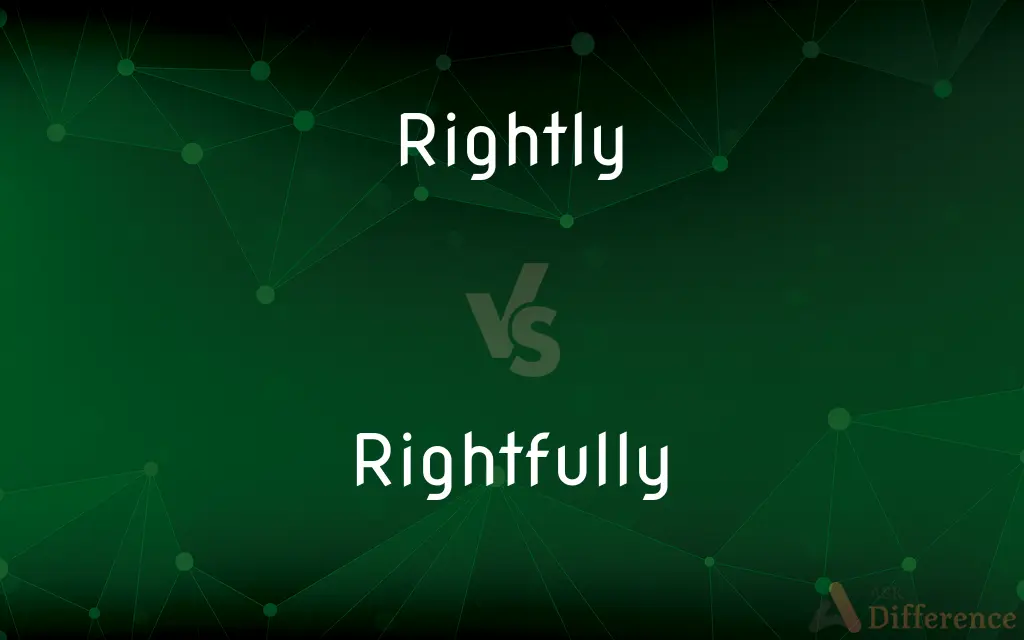Rightly vs. Rightfully — What's the Difference?
By Tayyaba Rehman & Maham Liaqat — Updated on March 10, 2024
Rightly refers to doing something correctly or appropriately, while rightfully denotes a legitimate claim or entitlement.

Difference Between Rightly and Rightfully
Table of Contents
ADVERTISEMENT
Key Differences
Rightly is used to indicate that something is done in a correct or suitable manner, often focusing on the correctness of an opinion, decision, or action. Rightfully, on the other hand, emphasizes the legitimacy or justice of possession, claim, or recognition, often involving moral or legal grounds.
When someone acts rightly, they are acting in accordance with what is proper or accurate in the situation. This can relate to making a correct judgment or performing a task the correct way. Whereas, when someone claims something rightfully, they assert their just or legal entitlement to it, suggesting that fairness or law supports their claim.
The usage of rightly often pertains to the realm of accuracy, suitability, and correctness in actions or thoughts. Conversely, rightfully is more about justice, entitlement, and moral or legal rights, implying a deeper layer of ethical or legal justification.
In conversation and writing, rightly can be used to commend the correctness of an action or thought, signifying approval of the methodology or reasoning. Rightfully, however, is typically invoked in discussions about justice, equity, and rights, often to argue for what is justly deserved or owed to someone.
Comparison Chart
Definition
Doing something in a correct or appropriate manner.
Having a legitimate claim or entitlement.
ADVERTISEMENT
Focus
Correctness, accuracy, and suitability.
Legitimacy, justice, and entitlement.
Context
Used regarding actions, decisions, or opinions.
Used in matters of moral, ethical, or legal rights.
Implication
Implies properness or accuracy in approach or thought.
Suggests a just claim or entitlement by law or morality.
Usage
Commends the correctness or appropriateness of something.
Asserts justice or entitlement to something.
Compare with Definitions
Rightly
Making a decision based on correct information.
She rightly decided to wait for more data.
Rightfully
Having a justified claim to something.
The heirs rightfully inherited the estate.
Rightly
Accurately or appropriately assessing a situation.
He rightly identified the problem's root cause.
Rightfully
Asserting one's rights or entitlements.
The workers rightfully demanded better conditions.
Rightly
Approaching a task with the correct method.
The technician rightly followed the safety procedures.
Rightfully
Deserving recognition or reward based on fairness.
She rightfully earned her promotion.
Rightly
Forming an opinion based on sound reasoning.
The jury rightly concluded that evidence was insufficient.
Rightfully
Based on legal or moral grounds.
He rightfully reclaimed his stolen property.
Rightly
Commending someone for proper action or thought.
You rightly pointed out the error in our calculations.
Rightfully
Emphasizing the legitimacy of an action or claim.
They rightfully protested for their rights.
Rightly
In a correct manner; properly
Act rightly.
Rightfully
Right or proper; just.
Rightly
With honesty; justly.
Rightfully
Having a just or proper claim
Return this dog to its rightful owner.
Rightly
(Informal) Really
I don't rightly know.
Rightfully
Held or owned by just or proper claim
This land is my rightful property.
Rightly
In a right manner, correctly, justifiably.
She was quite rightly disappointed in not being promoted.
I don't rightly know what he meant by that remark.
Rightfully
In accordance with what is right or just; fairly.
Rightly
Straightly; directly; in front.
Rightfully
Rightly, correctly.
Rightly
According to justice; according to the divine will or moral rectitude; uprightly; as, duty rightly performed.
Rightfully
According to right or justice.
Rightly
Properly; fitly; suitably; appropriately.
Eve rightly called, Mother of all mankind.
Rightfully
By right;
Baseball rightfully is the nation's pastime
Rightly
According to truth or fact; correctly; not erroneously; exactly.
Thou didst not rightly see.
Rightly
With honesty;
He was rightly considered the greatest singer of his time
Common Curiosities
Can "rightly" and "rightfully" be used interchangeably?
Not usually, as "rightly" pertains to correctness or suitability, while "rightfully" involves justice or entitlement.
How is "rightly" used in everyday language?
It's often used to affirm the correctness of an action, decision, or thought, or to acknowledge proper conduct.
How do cultural perceptions affect the use of "rightfully"?
Cultural values and norms can influence what is considered just or entitled, thereby affecting how "rightfully" is applied.
Does "rightfully" always involve legal claims?
Not always. "Rightfully" can also pertain to moral or ethical entitlements, not just legal ones.
Can an action be both "rightly" and "rightfully" done?
Yes, an action can be both correct and justly entitled, but the context will dictate which term is more appropriate.
Is "rightly" only used in positive contexts?
Mostly, yes. "Rightly" is used to indicate that something is done in the correct or appropriate manner.
How does "rightly" relate to ethical considerations?
"Rightly" can involve ethics when it pertains to making decisions or judgments that are morally correct or suitable.
What is an example of "rightfully" in a legal context?
Claiming an inheritance based on a will or law would be an example of rightfully asserting a legal entitlement.
Can "rightfully" imply a sense of deservedness?
Yes, "rightfully" often conveys a sense of something being deserved based on justice, fairness, or legal rights.
How does "rightly" relate to factual accuracy?
"Rightly" involves making judgments or taking actions that are based on accurate information or sound reasoning.
Share Your Discovery

Previous Comparison
Moderately vs. Somewhat
Next Comparison
Panache vs. ElanAuthor Spotlight
Written by
Tayyaba RehmanTayyaba Rehman is a distinguished writer, currently serving as a primary contributor to askdifference.com. As a researcher in semantics and etymology, Tayyaba's passion for the complexity of languages and their distinctions has found a perfect home on the platform. Tayyaba delves into the intricacies of language, distinguishing between commonly confused words and phrases, thereby providing clarity for readers worldwide.
Co-written by
Maham Liaqat















































